|
|
|
Sort Order |
|
|
|
Items / Page
|
|
|
|
|
|
|
| Srl | Item |
| 1 |
ID:
172377


|
|
|
|
|
| Summary/Abstract |
This article looks at drug trafficking, trade, and pilgrimage between Lebanon, Syria, and Palestine during the mandate period, arguing that a Levantine geography continued both as lived experience and conceived space even after the introduction of borders post-WWI. Drawing on the work of Patrick Hutton, it argues that Levantine geography can only be understood by reformulating the relationship between history and memory and bringing in the lived experience of Levantines into the writing of history.
|
|
|
|
|
|
|
|
|
|
|
|
|
|
|
|
| 2 |
ID:
172374
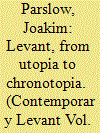

|
|
|
|
|
| Summary/Abstract |
This essay responds to this special issue’s challenge of thinking the Levant through Bakhtin’s notion of the chronotope, with a theoretical reflection on the potentials and limitations of chronotopic thought in social and historical scholarship. The essay is structured around two questions. First, given the overwhelmingly literary associations with which we tend to approach Bakhtin’s thought today, is the chronotope a tool for literary analysis only, or is it applicable to other forms of communication, cognition, and action? Second, what implications does chronotopic analysis have for scholarship that seeks methods of analysing and writing about the Levant in a historically and politically responsive way? Should chronotopes always be understood as the a priori horizon of meaningful narration, as frameworks that make certain plots, events, interpretations, and actions possible while precluding others, or are they also an observable and manipulatable aspect of communication, one that can be subject to the quotidian equivalent of authorial intention, creative reception, and political contestation? Placing the chronotope in the context of Bakhtin’s earlier philosophical project, I argue that although the chronotope facilitates the reflexivity and subversiveness which Bakhtin sees as defining and ethically necessary achievements of modern discourse, these characteristics are both self-limiting and morally ambiguous.
|
|
|
|
|
|
|
|
|
|
|
|
|
|
|
|
| 3 |
ID:
172373
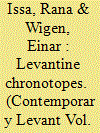

|
|
|
|
|
| Summary/Abstract |
Like all contested concepts, the term ‘Levant’ is unstable. Both its academic and political uses are geographically and historically fairly loose and ill-defined. This geo-historical instability makes room for the multiplicity of chronotopes that the contributors lay out in this special issue. In order to bring these contributions together, we also use the theoretical concept of the chronotope, the way that authors and actors under study bring together time and space in their legitimation of political efforts in the present. The chronotopes treated here have far-reaching implications in our experience and knowledge of the Levant. With Bakhtin’s chronotopic method, we approach the region through its entangled history, taking people’s mobility, their composite identities, and the major transformations in their lives as the central concern for analysis.
|
|
|
|
|
|
|
|
|
|
|
|
|
|
|
|
| 4 |
ID:
172375
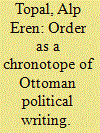

|
|
|
|
|
| Summary/Abstract |
This article proposes the concept of order as a major chronotope of Ottoman political writing which has shaped temporal projections such as decline and renewal from the seventeenth century onwards. In chronological order, I discuss the seventeenth-century debates on breakdown of social order and emergence of the sense of decline, and the eighteenth-century literature on Khaldunian concept of nomadic versus sedentary forms of habitation and spatiality of the debates over moral degeneration. The urban space of Istanbul, both material and abstract, as a political and social setting also figures prominently in these discussions and shapes Ottoman perceptions of the European city. Through a discussion of the chronotope of order I also challenge pervasive narratives of Westernisation and progress in favour of indigenous cyclical narratives of restoration and renewal.
|
|
|
|
|
|
|
|
|
|
|
|
|
|
|
|
| 5 |
ID:
172379
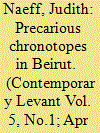

|
|
|
|
|
| Summary/Abstract |
This article argues that the intersection of time and space in large parts of the Levant is, above all, precarious. With a close analysis of two meaningful places in Beirut – the shrine of Rafic Hariri and the nightclub B018 – the article seeks to tease out how such a precarious chronotope is given form, meaning and value through narratives, practices and spatial design. Moreover, the article builds upon Walid Sadek’s conceptualisation of shared mourning as a possibility for a new sociality under Lebanon’s precarious conditions. It argues that despite their engagement with loss, the two sites under scrutiny here do not allow for such an ethical position. The findings of the analysis are relevant for the Levant more broadly as the flows of refugees in recent years have produced new and particularly precarious geographies inscribed with a profound sense of loss and grief.
|
|
|
|
|
|
|
|
|
|
|
|
|
|
|
|
| 6 |
ID:
172378
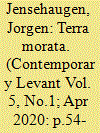

|
|
|
|
|
| Summary/Abstract |
When Menachem Begin, Israeli prime minister and founder of the Likud party, formulated Israel’s claim to the West Bank, he did not utilise the classic terra nullius settler argument. Instead, his ideological claim was that the land was a terra morata, a territory which had been in a state of ‘extratemporal hiatus’, to borrow a term from Bakhtin. This was illustrated through his insistence on using the Biblical names Judea and Samaria to denote the West Bank. The Zionist claim to the land was thus not that it lacked a sovereign, but rather that the sovereign had returned. The Israeli occupation was thus construed as a resumption of history, while the Palestinians were placed outside history, negating their historical and contemporary claim to the land. This article analyses how Begin’s worldview played out by investigating the self-rule proposal for the Palestinians which he launched in 1977. This proposal (if implemented) would have postponed any claims of sovereignty over the territory indefinitely, while ensuring that the Palestinians gained no national autonomy. In essence, Palestinian self-rule was a sleight of hand. For Begin the West Bank (and Gaza) were eternally Jewish territories, and the Palestinians mere residents on the land. Unlike Israeli settlers, they were not considered to be of the land.
|
|
|
|
|
|
|
|
|
|
|
|
|
|
|
|
| 7 |
ID:
172376
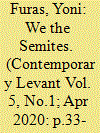

|
|
|
|
|
| Summary/Abstract |
This article reconceptualises ‘Semite’ as a contested chronotope in which Western scientific categories served Palestinian and Zionist educators’ claims to cultural self-determination and national claims over the same space, Palestine. Since the early nineteenth century, racial categories have gained prominence as useful scientific tools to differentiate peoples and cultures. This article analyses how Arabs and Jews adopted, translated, and engaged the term ‘Semite’, through an examination of Arabic and Hebrew history schoolbooks from the Mandate period. It surveys the genealogy of the term in Zionist and Palestinian historiography, showing the centrality of racial categories in the teaching of ancient history in mandate Palestine, and underlining parallels and differences in the engagement of Palestinian and Jewish educators with race. Finally, the article shows how the Palestinian-Zionist conflict wrote itself into the history textbooks, re-writing the ancient history of both peoples, and re-evaluating Palestine’s past through the prism of a contested chronotope, leading to a precarious present and an uncertain future.
|
|
|
|
|
|
|
|
|
|
|
|
|
|
|
|
|
|
|
|
|